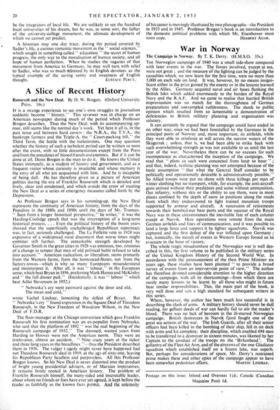War in Norway
The Campaign in Norway. By T. K. Derry. (H.M.S.O. 35s.) THE Norwegian campaign of 1940 was a small side-show compared with later events in the war. The forces involved, except at sea, were not great ; and the measure of the fighting can be judged by the casualties which, we now learn for the first time, were no more than 5,000 on each side on land. It was, however, by no means insigni- ficant either in the prize gained by the enemy or in the lessons learned by the Allies. Germany acquired naval and air bases flanking the British Isles which added enormously to the burden of the Royal Navy and the R.A.F. And we came to realise that hurried British improvisation was no match for the thoroughness of German preparations and unexampled ruthlessness. The shock to public opinion which resulted from so lamentable a demonstration of deficiencies in British military planning and organisation was salutary.
It can certainly be argued that the campaign could have ended in no other way, once we had been forestalled by the Germans in the principal ports of Norway and, more important, its airfields, while they were able to reinforce at will across the narrow waters of the Skagerrak ; unless, that is, we had been able to strike back with such overwhelming strength as was not available to us until the last year of the war. Nevertheless there can be no excuses for such incompetence as characterised the inception of the campaign. We read that " plans as such were concocted from hot& to hour and that, indeed, realistic planning was not attempted because of the basic assumption that what the General Staff consider to be politically and operationally desirable is administratively possible." So Allied troops were put on shore with three kitbags per man of winter clothing but no transport, while, for example, the anti-aircraft guns arrived without their predictors and some without ammunition. Our infantry, without skis or the ability to use them, were in most places confined by the depth of snow to positions along the roads from which they endeavoured to fight trained mountain troops supported by armour and aircraft. A succession of retirements towards their bombed-out base ports and the succour of the Royal Navy was in these circumstances the inevitable fate of each column except at Narvik. Here operations were remote from the main German airfields and lines of communication, and it was possible to. land a large force and support it by fighter squadrons. Narvik was captured and the first defeat of the war inflicted upon Germany ; but, ironically, the march of events in Western Europe forced us to evacuate in the hour of victory.
The whole tragic misadventure of the Norwegian war is well des- cribed in this, the first volume to be published in the military series of the United Kingdom History of the Second World War. In accordance with the announcement of the then Prime Minister six years ago, these studies have been plarthed "to provide a broad survey of events from an inter-service point of view." The author has therefore devoted considerable attention to the higher direction of the campaign, with all its shortcomings—from which there are surely many lessons to be learnt by all those who might in future bear similar responsibilities. This, the main- part of the book, is very well done and sets a high standard for subsequent writers in this series.
Where, however, the author has been much less successful is in describing the clash of arms. A military history should never be dull reading, for gallant deeds of war can hardly fail to stir the reader's blood. There was no lack of heroism in the ill-starred Norwegian campaign. British destroyers in Narvik fjord fought one of the great sea actions of the war. The Irish Guards, after all their senior officers had been killed in the bombing of their ship, fell in on deck with at-ms and kit complete; their discipline, which enabled 694 men to be transferred to a destroyer in sixteen minutes, was likened by her Captain to the conduct of the troops on the 'Birkenhead'. The gallantry of the Fleet Air Arm, and of the aircrews of the one Gladiator squadron which established itself on a frozen lake, was superb. But, perhaps for considerations of space, Mr. Derry's restrained prose makes these and other epics of the campaign appear to have been somewhat pedestrian affairs. MARTIN LINDSAY.






























 Previous page
Previous page